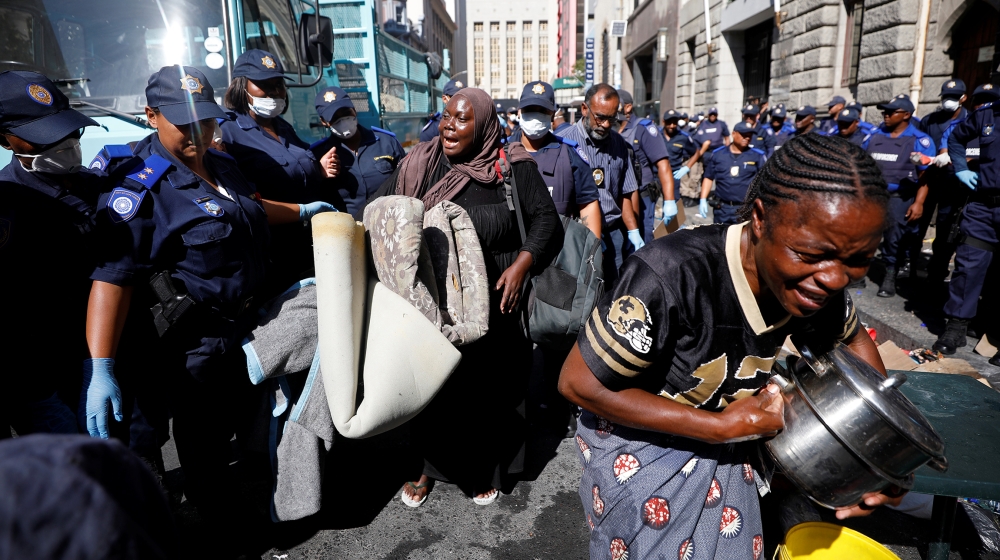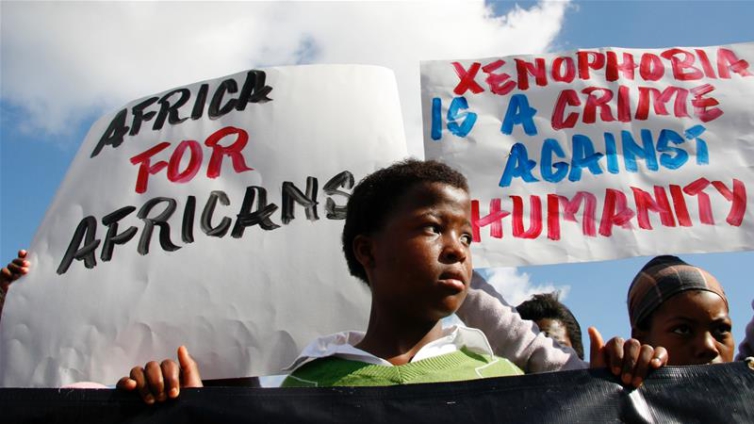Sleeping was not an option for Syed in early September last year.
For three days and night, the Bangladeshi shop owner in central Johannesburg said he had to stand guard to protect his store during an outbreak of xenophobic violence that saw rioters throw stones and other objects at him and other business people in the area.
Syed said the shopkeepers had called the police but they showed up only on the third day. By then, more than 1,000 Bangladeshi shops were looted, he added.
His account is one of the dozens included in a report released on Thursday by the Human Rights Watch (HRW), documenting mob attacks on migrant communities in South Africa by people who are angry at the dire economic and living conditions they are experiencing.
According to the findings in the HRW report, xenophobic harassment and violence against other Africans and Asians living in the country are routine and sometimes lethal.
Foreigners are scapegoated and blamed for economic insecurity, crime and government failures to deliver services, the report said. Non-South Africans are also being accused of stealing jobs and women, depleting the country's basic services, spreading diseases and running crime syndicates.
"The xenophobic actions constitute a betrayal of the South African constitutional promise," said Kristie Ueda, an HRW researcher and author of the report.
"The constitution promises human dignity and non-racialism. Non-nationals come to South Africa because there is this promise that they will be live freely and equality. But this idea has been betrayed," she added, referring to the "overarching trend of indifference" towards victims of xenophobic incidents.
"This sometimes take the form of flat-out denial and sometimes even the form of tacit approval."
'Fire and blood'
At least 12 people were killed and thousands displaced in a week of violence from September 2 to 9 when foreign-owned businesses were looted in different parts of Johannesburg. The rioting was accompanied by protests calling on foreigners to leave.
HRW said interviewees forwarded it WhatsApp texts and voice messages they had received in the days before the violence threatening it would become "deadly" and that "there will be fire and blood" if foreigners did not leave.
It was far from the first such incident in recent years. In 2017, violent anti-immigrant protests broke out in the capital, Pretoria, while in 2015, another wave of xenophobic attacks in different parts of the country killed several people and displaced thousands.
Angela Mudukuti, a Zimbabwean human rights lawyer, said, "Xenophobia affects all Black foreigners in South Africa.
It permeates every layer of society creating a uniquely hostile society that does nothing but drive a wedge between the rest of the continent and South Africa."

Counterfeit and documentation raids
For its report, HRW interviewed 51 people including victims, lawyers and activists between March 2019 and March 2020 in the Western Cape, Gauteng and Kwazulu-Natal provinces, the areas hit the hardest by xenophobic violence since the end of apartheid in 1994 until 2018, according to the Xenowatch monitoring group.
Non-South Africans interviewed by HRW also said the government and law enforcement officials have used counterfeit goods and documentation raids as a cover for xenophobic harassment and attacks.
They believe their shops have been disproportionately targeted by authorities conducting raids, during which police have used tear gas and rubber bullets, according to the report.
Police would storm shops suspected of selling counterfeit goods with the goal of destroying or removing such goods from the market.
But while the government says such operations protect the local economy and jobs, shopkeepers and sellers in central Johannesburg told HRW that the police sold confiscated goods back to them after ransacking their shops.
Al Jazeera contacted the Department of Home Affairs for comment but has not received a response at the time of publication.
On January 14, Aaron Motsoaledi, health minister at the time and the current minister of home affairs, said, "We are not xenophobic as a department and as a country."
Plan to combat xenophobia
In March 2019, the government launched the National Action Plan to Combat Racism, Racial Discrimination, Xenophobia and Related Intolerance (NAP).
The five-year plan's goal is to improve the protection of foreigners and their access to justice, as well as raise public awareness and understanding of xenophobia.
The NAP recommends creating mechanisms to ensure foreigners receive services they are entitled to, facilitating their integration and embracing a humane and dignified approach to managing migrants, refugees and asylum seekers.
Still, xenophobic violence has continued in the first year of the plan's existence.
"The NAP is more of a description of the problem with very broad and vague recommendations for anti-prejudice initiatives.
It's not a series of programmes with budgets," said Steven Gordon, a senior researcher at the Human Sciences Research Council (HSRC), decrying a "lack of measurable instruments that can be said to be implemented".
Commenting on the HRW's findings, Gordon said what is particularly striking is their similarity to the documentations included in a report released by the HRW back in 1998.
"Many of the issues are the same," he said. "For example, the issue of government underplaying the problem and the problems faced by vulnerable migrants like refugees and asylum seekers as well as the institutional resistance from officeholders."
Sharon Ekambaram, the head of the refugee and migrant rights programme at Lawyers for Human Rights (LHR), which runs walk-in law clinics for refugees and migrants in several cities, described South Africa's asylum system as "failed".
Ekambaram said over the past year the refugee reception office in Musina, a town in Limpopo province, had a 100 percent rejection rate of asylum seekers and of people seeking refugee status. "The quality of decision-making by officials is informed by xenophobia," Ekambaram argued.
According to Ekambaram, xenophobic sentiments are increasingly spread through social media.
Certain statements by politicians have also exacerbated the problem, she said, referring to a November 2018 statement made by Motsoaledi that the South African health system is "overburdened" by foreign nationals.
"The government is in denial of the xenophobia in our country. It has to recognise that hatred of foreigners is being fuelled in communities. There has to be consequences for those who loot and attack," she said.
Ueda, meanwhile, recommended urgent measures to improve the situation for foreigners. "One barrier to basic services is obtaining the right documentation.
The government should extend the validity of an asylum seeker permit to alleviate challenges foreigners face with the renewal of documents."
Other HRW recommendations include the formal monitoring of the NAP's implementation and the establishment of an accountability mechanism, as well the government acknowledging the existence of xenophobia in public statements.
Latest Stories
-
We did not play football – Hearts coach Ouattara rips into his team following Aduana defeat
7 minutes -
Shining the light on haemophilia and bleeding disorders in women and girls
10 minutes -
Producer price inflation for March eases to 24.4%
16 minutes -
We were undone by counter attacks – Ogum reflects on Kotoko’s heaviest defeat of the season
25 minutes -
MobileMoney LTD refutes claims of system breach following social media allegation
51 minutes -
VRA assures Ghanaians of sustainable power production
55 minutes -
Ghana unveils ambitious downstream agenda at Invest in African Energies: Accra Investor Briefing
1 hour -
Global Environment Facility completes key training to improve project oversight among operational focal points in West Africa
1 hour -
Ghana losing millions of dollars through smuggling of Coca-Cola products – MD discloses
1 hour -
Implementation committee inaugurated for establishment of Kumawu Nursing and Midwifery College
2 hours -
POJOBA congratulates Defence Minister Omane Boamah, extends invitation for June Speech Day
2 hours -
Palestine pushes for full UN membership, urges African support amid genocide accusations against Israel
3 hours -
‘Not the NDC’s legacy, it’s ours’ – NPP’s Haruna Mohammed on election review tradition
3 hours -
Ghana celebrates Francophonie walk
3 hours -
‘Mahama’s incompetent government will fall in 2028’ – NPP vows comeback
3 hours

